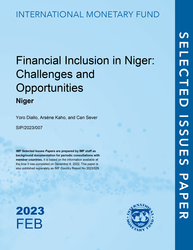
Financial Inclusion in Niger: Challenges and Opportunities: Niger
Financial inclusion can increase economic growth and productivity and reduce poverty and inequality by helping people and firms—particularly SMEs—to save and invest, smooth consumption, and better manage financial risks.
READ MORE...
Volume/Issue:
Volume 2023
Issue 007
Publication date: February 2023
ISBN: 9798400235726
$15.00
Add to Cart by clicking price of the language and format you'd like to purchase
Available Languages and Formats
| English |
Prices in red indicate formats that are not yet available but are forthcoming.
Topics covered in this book
This title contains information about the following subjects.
Click on a subject if you would like to see other titles with the same subjects.
Finance , Money and Monetary Policy , International - Economics , Demography , Financial Inclusion , Financial Institutions , Niger , Niger's lag , development agenda , Niger banking sector , MFI sector NPL ratio , BCEAO MFI , IMF staff calculation , Digital financial services , Digital currencies , Global
Summary
Financial inclusion can increase economic growth and productivity and reduce poverty and inequality by helping people and firms—particularly SMEs—to save and invest, smooth consumption, and better manage financial risks. This paper highlights Niger’s lag compared to other WAEMU countries in terms of access to and use of formal financial services, including for women and youth, and underscores key demand and supply side challenges to financial inclusion as well as structural impediments. It lays out key priorities for Niger to harness the potential of greater financial inclusion to support the country’s development agenda, including efforts to tackle low financial literacy, promote digitization, and address informality.
Copyright © 2010 - 2026
Powered by:
AIDC



